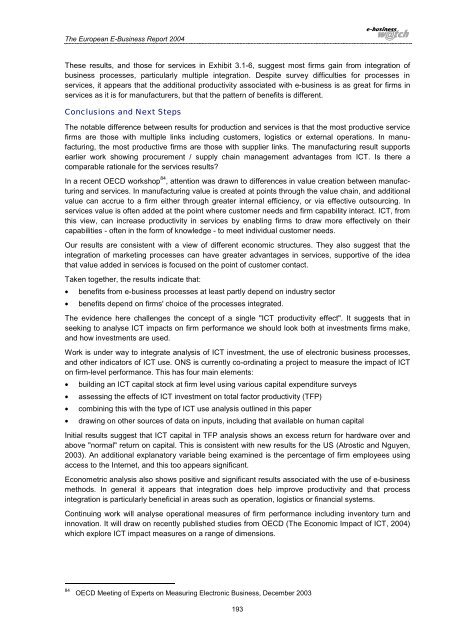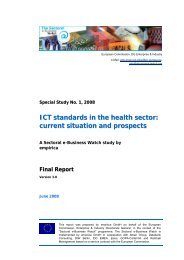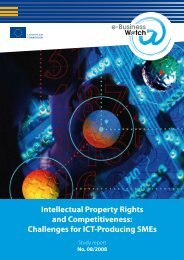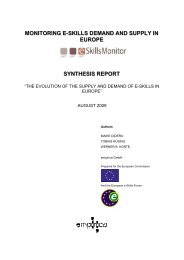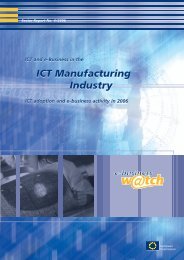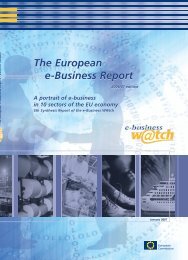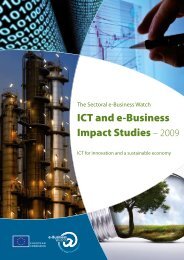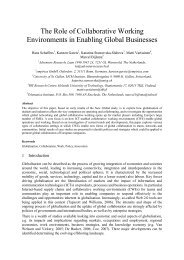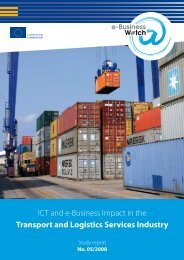The European e-Business Report 2004 - Berlecon Research GmbH
The European e-Business Report 2004 - Berlecon Research GmbH
The European e-Business Report 2004 - Berlecon Research GmbH
You also want an ePaper? Increase the reach of your titles
YUMPU automatically turns print PDFs into web optimized ePapers that Google loves.
<strong>The</strong> <strong>European</strong> E-<strong>Business</strong> <strong>Report</strong> <strong>2004</strong><strong>The</strong>se results, and those for services in Exhibit 3.1-6, suggest most firms gain from integration ofbusiness processes, particularly multiple integration. Despite survey difficulties for processes inservices, it appears that the additional productivity associated with e-business is as great for firms inservices as it is for manufacturers, but that the pattern of benefits is different.Conclusions and Next Steps<strong>The</strong> notable difference between results for production and services is that the most productive servicefirms are those with multiple links including customers, logistics or external operations. In manufacturing,the most productive firms are those with supplier links. <strong>The</strong> manufacturing result supportsearlier work showing procurement / supply chain management advantages from ICT. Is there acomparable rationale for the services results?In a recent OECD workshop 84 , attention was drawn to differences in value creation between manufacturingand services. In manufacturing value is created at points through the value chain, and additionalvalue can accrue to a firm either through greater internal efficiency, or via effective outsourcing. Inservices value is often added at the point where customer needs and firm capability interact. ICT, fromthis view, can increase productivity in services by enabling firms to draw more effectively on theircapabilities - often in the form of knowledge - to meet individual customer needs.Our results are consistent with a view of different economic structures. <strong>The</strong>y also suggest that theintegration of marketing processes can have greater advantages in services, supportive of the ideathat value added in services is focused on the point of customer contact.Taken together, the results indicate that:• benefits from e-business processes at least partly depend on industry sector• benefits depend on firms' choice of the processes integrated.<strong>The</strong> evidence here challenges the concept of a single "ICT productivity effect". It suggests that inseeking to analyse ICT impacts on firm performance we should look both at investments firms make,and how investments are used.Work is under way to integrate analysis of ICT investment, the use of electronic business processes,and other indicators of ICT use. ONS is currently co-ordinating a project to measure the impact of ICTon firm-level performance. This has four main elements:• building an ICT capital stock at firm level using various capital expenditure surveys• assessing the effects of ICT investment on total factor productivity (TFP)• combining this with the type of ICT use analysis outlined in this paper• drawing on other sources of data on inputs, including that available on human capitalInitial results suggest that ICT capital in TFP analysis shows an excess return for hardware over andabove "normal" return on capital. This is consistent with new results for the US (Atrostic and Nguyen,2003). An additional explanatory variable being examined is the percentage of firm employees usingaccess to the Internet, and this too appears significant.Econometric analysis also shows positive and significant results associated with the use of e-businessmethods. In general it appears that integration does help improve productivity and that processintegration is particularly beneficial in areas such as operation, logistics or financial systems.Continuing work will analyse operational measures of firm performance including inventory turn andinnovation. It will draw on recently published studies from OECD (<strong>The</strong> Economic Impact of ICT, <strong>2004</strong>)which explore ICT impact measures on a range of dimensions.84OECD Meeting of Experts on Measuring Electronic <strong>Business</strong>, December 2003193


